Again, no zombies.
Thomas M. Disch - The M.D. (1991)
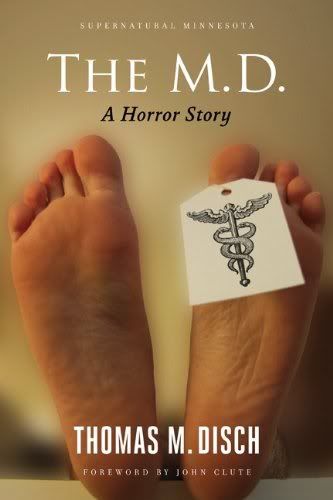
If John Irving ever decided to write horror, he might come up with something like this.
Thomas M. Disch started his career as a fairly celebrated author of "outsider" science fiction back in the 1960s (The Genocides and Camp Concentration being his two most well-known books) before switching to horror in the 1980s and 1990s and penning an equally celebrated quadrilogy of novels set in his native Minnesota.
The Businessman (1984) is the first and probably the best known of these, but he really hit his stride with The M.D.. It's a bizarre Magnificent Ambersons by way of Stephen King sort of book that follows a young boy named Billy Michaels from his Kindergarten days up through his teen years and ending with his massive success (and downfall) as a celebrity doctor.
Early on, Billy meets a figure that appears to him as Santa Claus but later reveals himself to be the Greek god Mercury. Mercury gives Billy a caduceus -- a twig wrapped in snakelike vine, with a mummified bird tied to the top -- that grants him the power to heal. The catch is that for ever person he heals, Billy has to recharge the caduceus by causing someone else harm.
The M.D. is at once epic and deeply intimate, and the details of Billy's life and his eccentric, dysfunctional family are finely drawn. It's also a viciously cynical book that alternates between some truly disturbing images and ideas, unexpected pathos for the characters, and Disch's razor-sharp and sometimes cruel sense of humor. The inevitable tragedy in the last third of the book is Shakespearean in proportion, but you never lose the sense that Disch is cackling all the way to the last page.
Ramsey Campbell - The Doll Who Ate His Mother (1976)
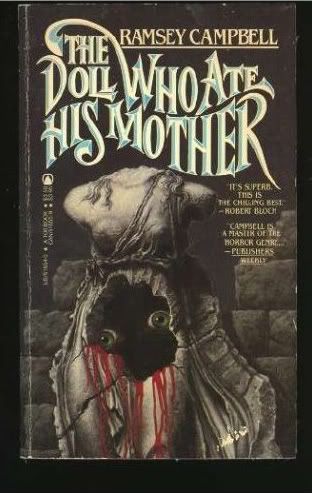
Campbell is a British writer who is absolutely revered by horror fans and virtually unknown by everyone else. The Doll Who Ate His Mother is his first novel, and not his best. But there's something about the youthful naivete behind the prose that is fascinating and more than a little disturbing. Campbell comes up with some pretty squalid ideas and images here, and he doesn't quite seem to realize it. I don't know why, but there's a certain charm in that for me.
The story concerns a young Liverpudlian woman, Clare, who is involved in a terrible car accident. Her brother is killed, and a mysterious figure runs off into the night with his severed arm.
Later, a sleazy true crime writer who believes the arm snatcher to be a former childhood friend of his aproaches Clare and enlists her help in tracking the man down.
This story is structured more like a mystery, but there's something weird and feverish about the prose that elevates it to the realm of dark fantasy, and the details as we learn them grow increasingly nasty, definitely tipping the scales toward horror. This isn't a particularly gory or violent book, but there's something pervasively icky about it all the way through. "Quiet depravity" is the best phrase I can think of to describe it.
Jack Ketchum - The Girl Next Door (1989)
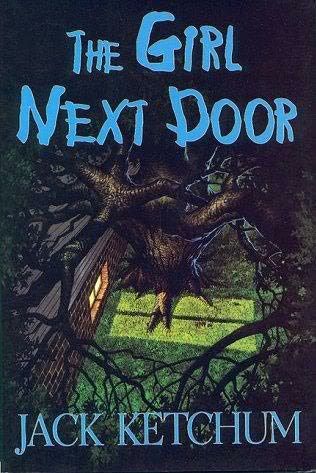
I don't usually recommend this book, for fear that people will lay siege to my house with pitchforks and torches.
A fictional retelling of the Sylvia Likens story, The Girl Next Door is one of the most brutal, violent, and harrowing books I've ever read. It's like American Psycho if Patrick Bateman was a 12-year-old kid and without all that business about expensive shampoo, fancy restaurants, and Whitney Houston.
What makes this novel so effective, however, isn't the depravity (which Ketchum actually toned down a bit from the true story) but the seething sense of outrage that boils beneath Ketchum's matter-of-fact prose. Ketchum explained in the forward to the novel's reissue that he rarely writes supernatural horror because people are what scare him, and that his response to being scared is to get mad. When you read The Girl Next Door, you'll believe it. As vicious as it is, there's nothing exploitive about it. And when -- preceeding a particularly nasty bit of violence -- the narrator breaks the fourth wall and tells us that he simply can't bring himself to describe what happened, you get the sense that it's Ketchum addressing us, not the character.
Phil Rickman - Curfew (1993)
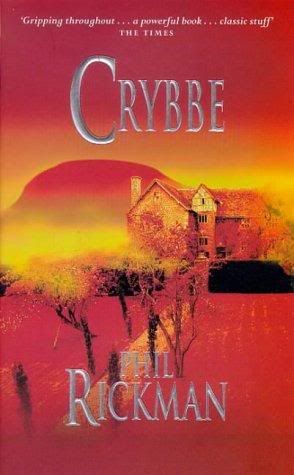
Known as Crybbe in the UK (I guess the publishers thought American audiences wouldn't go for a book titled with some strange Welsh word), Curfew is one of those pretty classic "strange shit happens in a rural town with dark secrets" sort of stories that horror novelists have been milking at least since the days of H.P. Lovecraft.
Crybbe is a little Welsh backwater nestled mere kilometers from the English border. The only distinguishing features are the Tump, a prehistoric man-made mound of indeterminate purpose, and the odd ritual of ringing the bell in the church tower every night to signal an ancient curfew.
Max Goff is a ruthless and impossibly rich record producer from London who descends upon the town with two ambitions: to resurrect the ancient standing stones that have been methodically removed over the centuries and to stage a huge, kickass rock concert celebrating the spirit of the Earth or some other such New Age bullshit.
Goff hires a local dowser to find the original locations of the standing stones. When the dowser is killed in a mysterious car accident near the Tump, he proceeds undeterred. The townspeople grow more and more nervous as the concert date approaches.
And then, of course, hijinks ensue.
What sets this book apart from all the others like it is the way Rickman, a truly masterful writer, evocatively draws us into the world of the Welsh/English borderlands and lets us get to know its many dour inhabitants before ever-so-slowly ratcheting up the creep factor to near excruciating levels. This is one of those long, rich books that you can just live inside of for weeks.
T.E.D. Klein - The Ceremonies (1984)
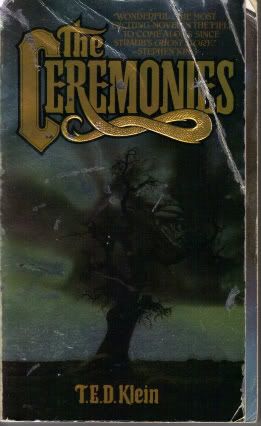
T.E.D. Klein is a semi-mysterious and somewhat legendary figure in the horror world. He is strikingly non-prolific, having published only two books, The Ceremonies in 1984 and a collection of novellas titled Dark Gods the following year. He's also really, really, really damn good.
I actually prefer Dark Gods to this book, so if you're interested check it out here. Regardless, The Ceremonies stands tall as one of the few unacknowledged masterpieces of "literary" horror.
The book is split into two parallel stories. The first follows Jeremy, a graduate student in literature who moves to a seemingly idyllic town in New Jersey dominated by a strange religious cult to work on his thesis. The second concerns Carole, a naive young woman trying to make her way in New York City. Both characters are linked by an odd and menacing little old man named Mr. "Rosie" Rosebottom.
Over the course of more than 500 pages, the two stories gradually (excruciatingly so, some might say) converge as we come to learn more about Rosie's demonic agenda for both Jeremy and Carol.
Klein is a deliberate and understated writer whose work echoes not only Lovecraft, but the classic dark fiction of authors like M.R. James and Algernon Blackwood. If you're looking for quick and cheap scares, this isn't the book for you. But Klein's prose has a way of burrowing slowly and surely under your skin. The only other writer I can think of who does this better is Patrick McGrath. You'll find, as you turn the pages, that it's the smallest little details that make your skin crawl, and it's the accumulation of these details that eventually builds into a surprisingly affecting novel that is bound to stick with you.
So long as you stay with it, that is.
Honorable Mentions:
Thomas Tryon - Harvest Home
Fritz Leiber - Our Lady of Darkness
Poppy Z. Brite - Drawing Blood
Thomas Tessier - Rapture
Kim Newman - Jago
John Skipp and Craig Spector - The Scream
Joe R. Lansdale - The Nightrunners
Dan Simmons - Carrion Comfort
Bari Wood - Doll's Eyes
Robert Marasco - Burnt Offerings
4 comments:
THANK YOU FOR MENTIONING HARVEST HOME! That book freaked the crap out of me AND it's one of my Dad's all-time faves. I'm on my way to BN now to purchase the other books. Great post, duder! xo-Mandy
Yeah I almost reviewed that one, but I decided it was a little too similar to "Curfew." But it's a great book!
Good list, I've read a good handful... not sure if I'll ever read GIRL NEXT DOOR, however.
Oh, my goodness. I ran across this researching for a short story I am working on, and I was absolutely ecstatic to see The Curfew by Phil Rickman on here. I read that book years ago, and after reading many more books, my mind wandered back to it one day. It took me quite some time to track down the name of the novel as I could remember neither the name nor the author. Agh! I loved that book!!
Post a Comment